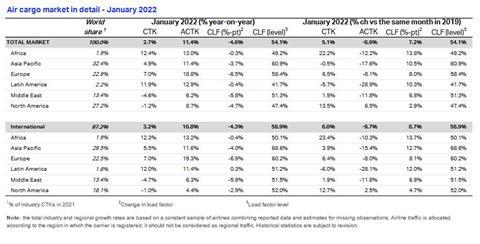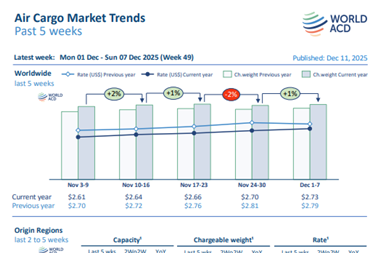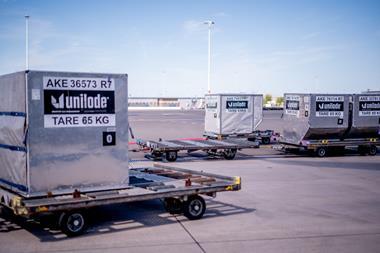Air cargo growth figures for January were "below expectations" while the outlook for the year ahead is uncertain, according to IATA.
The airline association's latest monthly report shows that global air cargo demand in cargo tonne km terms increased by 2.7% year on year in January.
Capacity for the month was up by 11.4% aginst a year earlier - although it is still down around 8.9% on pre-Covid levels - and cargo load factors were down 4.6 percentage points year on year to 54.1%.
IATA director general Willie Walsh said: “Demand growth of 2.7% in January was below expectation, following the 9.3% recorded in December. This likely reflects a shift towards the more normal growth rate of 4.9% expected for this year.
"Looking ahead, however, we can expect cargo markets to be impacted by the Russia-Ukraine conflict.
"Sanction-related shifts in manufacturing and economic activity, rising oil prices and geopolitical uncertainty are converging. Capacity is expected to come under greater pressure and rates are likely to rise. To what extent, however, it is still too early to predict."
Looking at air cargo indicators, IATA pointed out that the purchasing managers index tracking export orders had dropped below the 50 point mark for the first time since August 2020, but added that inventory-to-sales ratios remained low.
On the Russia-Ukraine conflict, IATA said that overall it would have a negative impact on air cargo, but it may not cause too much of a drop off in demand levels.
"The impact on global markets is expected to be low as cargo carried to/from/within Russia accounted for just 0.6% of the global cargo carried by air in 2021," IATA said, adding: "Several specialised cargo carriers are registered in Russia and Ukraine, particularly those involved with heavy lift operations."
Looking at regional performance, Asia Pacific airlines registered a 4.9% year-on-year increase in cargo traffic in January, although this was "significantly" below the previous month’s 12% expansion.
"The zero-Covid policy in mainland China and Hong Kong is impacting performance," IATA said. "Preparations for the Lunar New Year holiday may have also had an impact on volumes, but it is difficult to isolate."
Carriers in the North America region posted a 1.2% decrease in cargo demand as supply chain congestion due to labor shortages, severe winter weather and issues with the deployment of 5G as well as a rise in inflation and weaker economic conditions affected growth.
In Europe, there was a 7% increase as the region was "more resilient" than most other regions.
"European carriers benefited from robust economic activity and an easing in capacity," IATA said.
Middle Eastern carriers also registered a fall, with cargo traffic dropping 4.6% due to a "deterioration in traffic on several key routes such as Middle East-Asia, and Middle East-North America".
Latin America carriers reported a January increase in cargo demand of 11.9% compared with a year ago, although this is "well below" pre-Covid levels, and African airlines saw cargo traffic increase by 12.4%.
Click to enlarge:
















